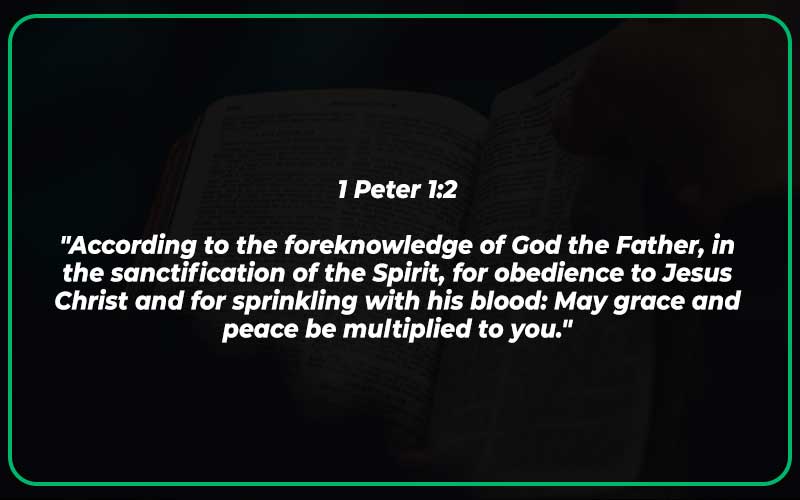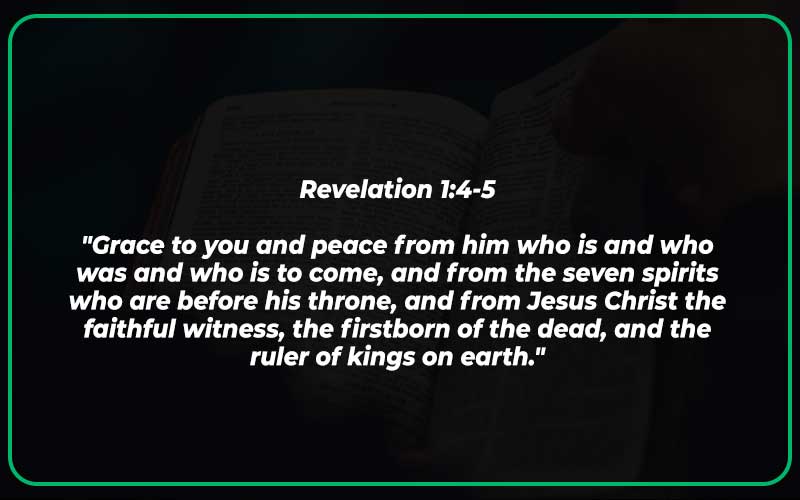The concept of the Trinity—God the Father, God the Son (Jesus Christ), and God the Holy Spirit—reveals the intricate nature of God’s being.
The Bible contains verses that help us grasp the mystery of the Trinity and deepen our understanding of God’s triune nature.
Join me as we delve into Scripture, exploring enlightening Bible verses about the Trinity, and uncovering the beauty and complexity of our limitless God.
Also Read: Bible Verses About Resurrection of Jesus
Bible Verses About Trinity
Matthew 28:19
“Go therefore and make disciples of all nations, baptizing them in the name of the Father and of the Son and of the Holy Spirit.”
This verse is a clear reference to the Trinity, as it includes all three persons of the Godhead – the Father, the Son, and the Holy Spirit. It is a command from Jesus to his disciples to go and make more disciples, baptizing them in the name of the Triune God.
2 Corinthians 13:14
“The grace of the Lord Jesus Christ and the love of God and the fellowship of the Holy Spirit be with you all.”
This verse is a benediction from Paul, which includes all three persons of the Trinity. It highlights the grace of Jesus, the love of God, and the fellowship of the Holy Spirit, demonstrating the unity and interconnectedness of the Godhead.
John 14:16
“And I will ask the Father, and he will give you another Helper, to be with you forever.”
In this verse, Jesus promises to send the Holy Spirit to his disciples as another Helper, emphasizing the distinct personhood of the Spirit within the Godhead. It also highlights the role of the Father in sending the Spirit at Jesus’ request.
Romans 8:11
“If the Spirit of him who raised Jesus from the dead dwells in you, he who raised Christ Jesus from the dead will also give life to your mortal bodies through his Spirit who dwells in you.”
This verse speaks to the power of the Holy Spirit, who indwells believers and gives them new life. It also highlights the unity of the Trinity, as the Spirit is referred to as both “him” and “his” in reference to God the Father.
Ephesians 4:4-6
“There is one body and one Spirit—just as you were called to the one hope that belongs to your call—one Lord, one faith, one baptism, one God and Father of all, who is over all and through all and in all.”
This passage emphasizes the unity of the Trinity and the oneness of God. It highlights the different roles of each person within the Trinity, and how they work together towards the salvation of believers.
1 Peter 1:2
“According to the foreknowledge of God the Father, in the sanctification of the Spirit, for obedience to Jesus Christ and for sprinkling with his blood: May grace and peace be multiplied to you.”
This verse highlights the distinct roles of each person within the Trinity in the process of salvation. It acknowledges God the Father’s foreknowledge, the Holy Spirit’s sanctification, and Jesus’ sacrifice as the basis for the grace and peace that believers receive.

Colossians 2:9
“For in him the whole fullness of deity dwells bodily.”
This verse speaks to the deity of Jesus, who is fully God and fully man. It emphasizes the unity of the Trinity, as Jesus is part of the Triune God and possesses all the attributes of deity.
Isaiah 9:6
“For to us a child is born, to us a son is given; and the government shall be upon his shoulder, and his name shall be called Wonderful Counselor, Mighty God, Everlasting Father, Prince of Peace.”
This verse is a prophetic reference to Jesus, who is called Mighty God and Everlasting Father. It reveals the unity of the Trinity, as Jesus is not the Father but is still called by that name, demonstrating their interconnectedness and oneness.
Romans 15:16
“To be a minister of Christ Jesus to the Gentiles in the priestly service of the gospel of God, so that the offering of the Gentiles may be acceptable, sanctified by the Holy Spirit.”
This verse highlights the three persons of the Trinity and their involvement in the salvation of the Gentiles. It acknowledges Jesus as the mediator and Paul as his minister, and also emphasizes the role of the Holy Spirit in sanctifying believers.
Genesis 1:26
“Then God said, ‘Let us make man in our image, after our likeness…'”
This verse is a reference to the creation of man, and it uses the plural “us” and “our” to describe God. This foreshadows the revelation of the Triune God in the New Testament, and highlights the unity and diversity of the Godhead.
Hebrews 1:8
“But of the Son he says, ‘Your throne, O God, is forever and ever, the scepter of uprightness is the scepter of your kingdom.'”
In this verse, the author of Hebrews quotes Psalm 45 and applies it to Jesus, referring to him as God and acknowledging his divine nature within the Trinity.
John 1:1
“In the beginning was the Word, and the Word was with God, and the Word was God.”
This verse speaks to the pre-existence of Jesus and his identity within the Trinity. It emphasizes his eternality and equality with God the Father.
Galatians 4:6
“And because you are sons, God has sent the Spirit of his Son into our hearts, crying, ‘Abba! Father!'”
This verse highlights the distinct roles of each person within the Trinity and their involvement in the lives of believers. It acknowledges the Spirit’s work in indwelling believers and prompting them to cry out to God as their Father.
Psalm 33:6
“By the word of the LORD the heavens were made, and by the breath of his mouth all their host.”
This verse refers to the creative power of God, who spoke the world into existence through his Word and the breath of his mouth. This foreshadows the revelation of the Son and the Spirit in the New Testament as co-creators and members of the Godhead.
Jude 1:20-21
“But you, beloved, building yourselves up in your most holy faith and praying in the Holy Spirit, keep yourselves in the love of God, waiting for the mercy of our Lord Jesus Christ that leads to eternal life.”
This passage highlights the active involvement of each person within the Trinity in the lives of believers. It encourages believers to build themselves up in their faith, pray in the Spirit, and keep themselves in the love of God as they await the return of Jesus.
1 Corinthians 12:4-6
“Now there are varieties of gifts, but the same Spirit; and there are varieties of service, but the same Lord; and there are varieties of activities, but it is the same God who empowers them all in everyone.”
In this verse, Paul emphasizes the diversity within the Trinity as he speaks to the variety of gifts, service, and activities given to believers by the Holy Spirit, the Lord (Jesus), and God the Father, respectively. However, he also highlights their unity as the source of empowerment for all believers.
1 John 5:6-7
“This is he who came by water and blood—Jesus Christ; not by the water only but by the water and the blood. And the Spirit is the one who testifies, because the Spirit is the truth. For there are three that testify.”
This verse is one of the clearest references to the Trinity in the Bible, acknowledging the roles of Jesus (water and blood), the Spirit (truth), and the Father (as inferred by the three that testify). It emphasizes the unity and witness of the Godhead as they reveal the truth about Jesus and salvation.
Revelation 1:4-5
“Grace to you and peace from him who is and who was and who is to come, and from the seven spirits who are before his throne, and from Jesus Christ the faithful witness, the firstborn of the dead, and the ruler of kings on earth.”
This verse acknowledges the Trinity and their involvement in the lives of believers. It refers to the Father as the one who is, was, and is to come, the Holy Spirit as the seven spirits before his throne, and Jesus as the faithful witness, firstborn of the dead, and ruler of kings on earth.

What does the Bible say About the Trinity?
The concept of the Trinity is a central doctrine in Christianity, which asserts that there is one God who exists as three distinct persons: God the Father, God the Son (Jesus Christ), and God the Holy Spirit. Though the word “Trinity” is not explicitly found in the Bible, the concept is derived from various passages.
- God the Father: The Bible presents God as the creator of the universe, the source of all life, and the loving Father of all believers. Numerous Old and New Testament verses describe God’s attributes and His role as the supreme authority and ruler over all.
- God the Son (Jesus Christ): The New Testament portrays Jesus as the Son of God, fully divine, and fully human. He is referred to as the Word (Logos) made flesh, and through His incarnation, Jesus revealed God’s nature and purpose to humanity. The New Testament emphasizes Jesus’ teachings, His sacrifice on the cross, and His resurrection as evidence of His divinity.
- God the Holy Spirit: The Holy Spirit is presented as the third person of the Trinity. The Bible describes the Holy Spirit’s role as a helper, comforter, and advocate for believers. The Spirit empowers Christians for service, convicts people of sin, and plays a vital role in the process of salvation.
The doctrine of the Trinity is not a straightforward concept to grasp fully, and it has been a subject of theological debate throughout Christian history. The early Christian councils, such as the Council of Nicaea in 325 AD, played a significant role in formulating and establishing the orthodox understanding of the Trinity.
Christians believe that the Father, the Son, and the Holy Spirit are co-equal and co-eternal, yet distinct persons within the one Godhead. They share a unique relationship of unity, love, and purpose, working together in harmony to accomplish the divine plan of redemption and salvation for humanity.

